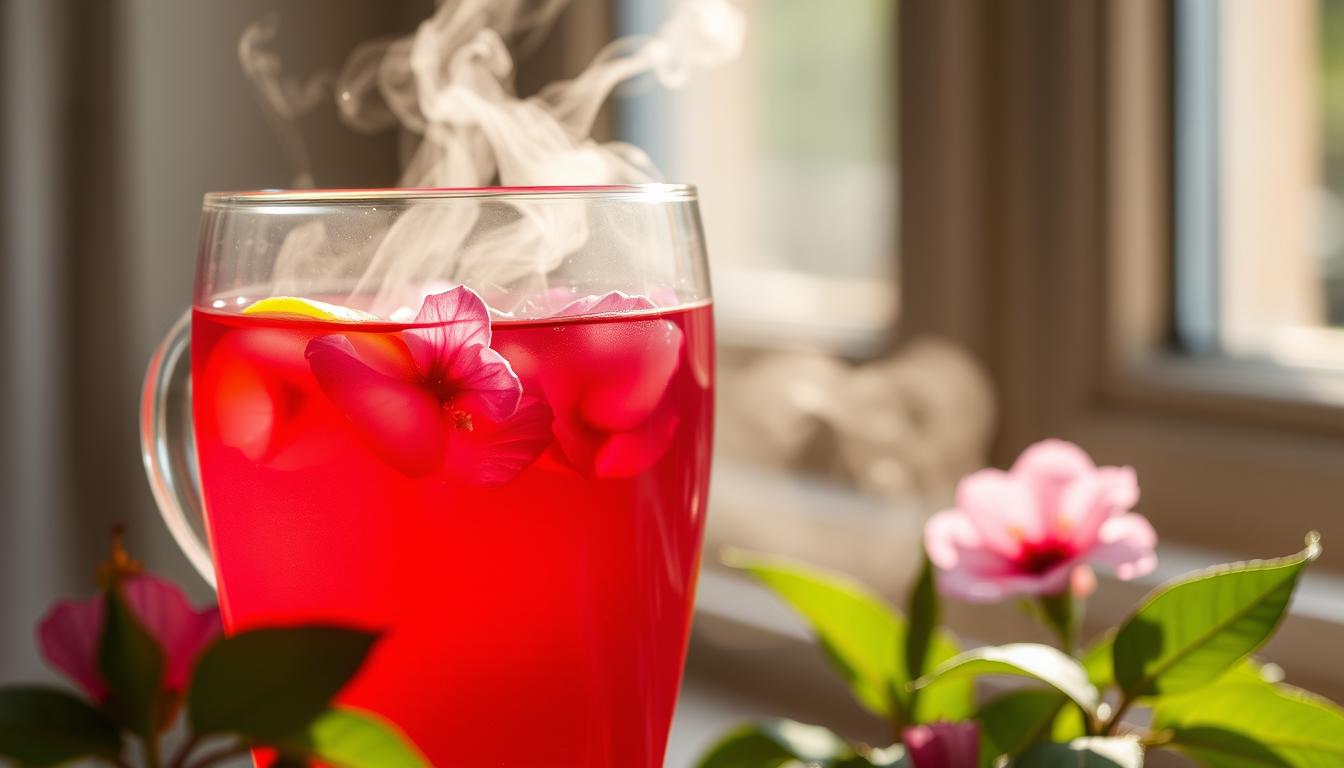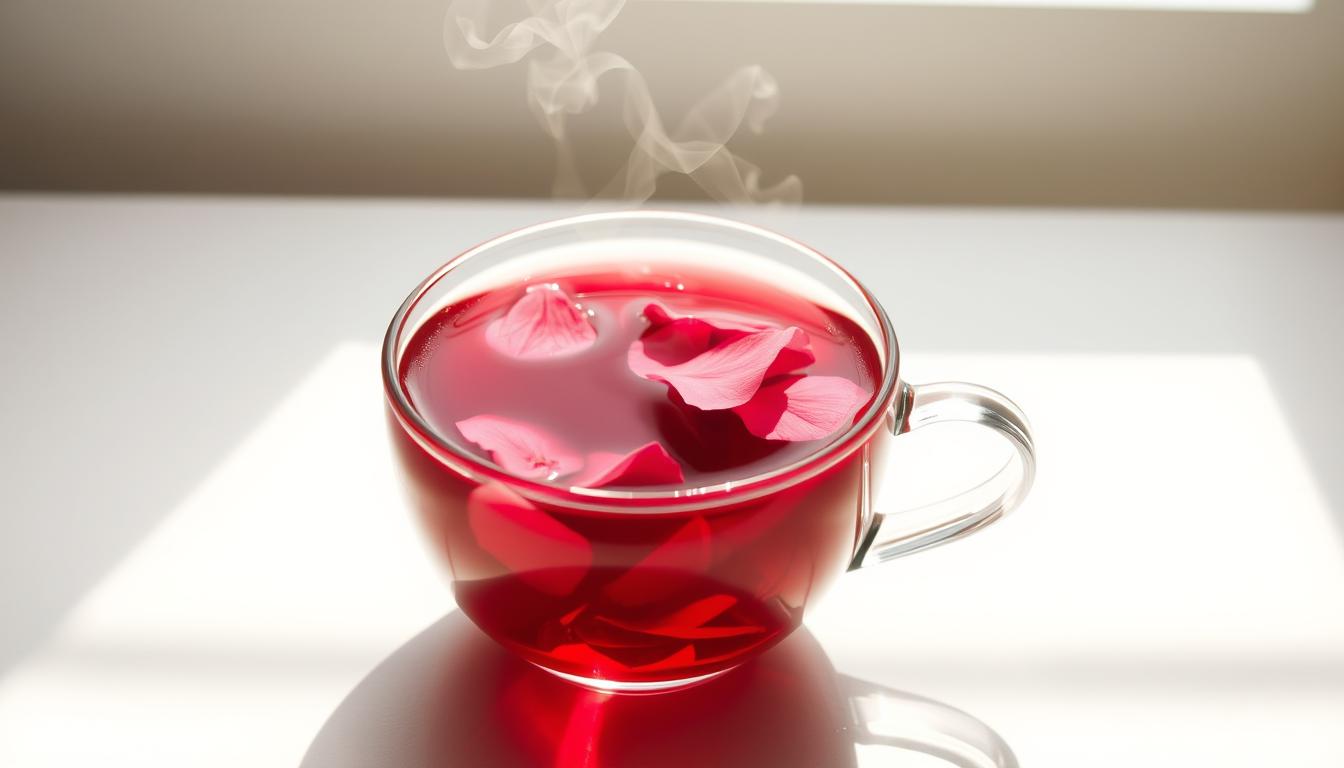Did you know that over 158 million Americans drink tea daily? Among the many options, herbal teas like hibiscus have gained popularity for their unique flavor and potential health benefits. But one question often arises: Is hibiscus tea caffeinated?
This article dives into the science behind this vibrant herbal beverage. We’ll explore whether it contains caffeine, its nutritional profile, and what research says about its effects on the body. Whether you’re looking for a caffeine-free alternative or curious about its benefits, we’ve got you covered.
Hibiscus tea is naturally caffeine-free, making it a great choice for those avoiding stimulants. Its rich, tangy flavor and vibrant red color make it a refreshing option for any time of day. Beyond its taste, studies suggest it may offer antioxidant support and other health advantages.
We’ll also examine its potential effects on blood pressure, weight management, and overall well-being. By the end, you’ll have a clear understanding of what this herbal tea can bring to your daily routine.
Key Takeaways
- Hibiscus tea is naturally caffeine-free, making it a safe choice for those avoiding caffeine.
- This herbal tea is rich in antioxidants, which may support overall health.
- Research suggests it may help manage blood pressure levels.
- Its tangy flavor and vibrant color make it a refreshing beverage option.
- Studies indicate potential benefits for weight management.
Introduction to Hibiscus Tea
The hibiscus plant, with its striking flowers, is the star behind this caffeine-free beverage. Known for its deep red calyces, this plant has been used for centuries to brew a tangy, cranberry-like drink. Often referred to as roselle, it holds a special place in many cultures for its culinary and medicinal uses.

Hibiscus tea is made from the dried calyces of the hibiscus flower. Its vibrant color and tart flavor make it a refreshing choice for any time of day. Beyond its taste, this herbal drink is packed with antioxidants, vitamins, and minerals, offering a range of health benefits.
Research has found hibiscus to be a valuable ingredient in traditional medicine. Studies suggest it may support weight loss, help manage cholesterol levels, and promote liver health. Its potential to lower blood pressure has also been a focus of recent studies.
Whether enjoyed hot or iced, hibiscus tea is a versatile and nutritious addition to your daily routine. Its rich history and promising research make it a beverage worth exploring.
Does hibiscus tea have caffeine?
For those avoiding caffeine, hibiscus tea is a popular choice. Unlike traditional teas made from Camellia sinensis, this herbal drink is naturally caffeine-free. This makes it an excellent option for individuals sensitive to stimulants or those looking for a relaxing beverage.

Research confirms that hibiscus tea, derived from the Hibiscus sabdariffa plant, contains no caffeine. This distinction sets it apart from black or green teas, which often contain varying levels of this stimulant. The absence of caffeine allows it to be enjoyed at any time of day without disrupting sleep patterns.
Studies have highlighted the benefits of this caffeine-free herbal tea. It may help promote relaxation and reduce stress, making it ideal for evening consumption. Additionally, its lack of caffeine makes it suitable for individuals with conditions like high blood pressure, where stimulants are often discouraged.
Beyond its caffeine-free nature, hibiscus tea offers a range of health benefits. Research suggests it may support cardiovascular health and help manage blood pressure levels. Its rich antioxidant content further enhances its appeal as a nutritious beverage.
Whether you’re seeking a calming drink or a flavorful alternative to caffeinated beverages, hibiscus tea is a versatile choice. Its unique properties and health benefits make it a standout option in the world of herbal teas.
Nutritional Profile and Antioxidant Power
Packed with essential nutrients, hibiscus tea stands out as a powerhouse of health benefits. This vibrant beverage is low in calories yet rich in vitamins and minerals, making it a nutritious addition to your diet. Its unique composition sets it apart from other herbal drinks.
Key Vitamins and Minerals
Hibiscus tea contains trace amounts of essential nutrients that support overall health. It provides small but significant levels of vitamin C, iron, and magnesium. These nutrients play a vital role in boosting immunity, improving energy levels, and maintaining healthy bodily functions.
“The nutritional profile of hibiscus tea makes it a standout choice for those seeking a healthful beverage.”
Below is a breakdown of the key nutrients found in a typical serving of hibiscus tea:
| Nutrient | Amount per Serving |
|---|---|
| Vitamin C | 2 mg |
| Iron | 0.2 mg |
| Magnesium | 3 mg |
The Role of Polyphenols and Anthocyanins
One of the most remarkable properties of hibiscus tea is its high antioxidant content. Polyphenols and anthocyanins, found in abundance in the hibiscus sabdariffa plant, are responsible for its vibrant color and health benefits. These compounds help protect the body from free radical damage, reducing the risk of chronic diseases.
Research shows that hibiscus extract contains significant amounts of these antioxidants. Studies suggest they may support cardiovascular health by improving blood vessel function and reducing inflammation. This makes hibiscus tea a valuable addition to a heart-healthy diet.
Here are some key benefits of polyphenols and anthocyanins in hibiscus tea:
- Support heart health by improving circulation.
- Reduce oxidative stress in the body.
- Promote healthy aging by protecting cells.
With its unique nutritional profile and potent antioxidants, hibiscus tea offers a refreshing way to support your health. Whether enjoyed hot or iced, this beverage is a flavorful and beneficial choice.
Cardiovascular Benefits and Blood Pressure Support
Cardiovascular health is a top priority for many, and hibiscus tea offers a natural way to support it. This vibrant herbal drink has been studied for its potential to improve heart health, particularly in managing blood pressure and cholesterol levels.
Research from 2020 and 2021 highlights the positive effects of regular consumption. Studies show that this beverage may help lower blood pressure, making it a valuable addition to a heart-healthy lifestyle. Its antioxidant properties play a key role in these benefits.
Impact on Systolic and Diastolic Pressure
One of the most notable benefits of hibiscus tea is its ability to influence systolic and diastolic blood pressure. Clinical reviews suggest that bioactive compounds in the tea help relax blood vessels, promoting better circulation. This can lead to a significant reduction in both systolic and diastolic readings.
“Regular intake of hibiscus tea has been associated with measurable improvements in blood pressure levels, offering a natural approach to cardiovascular care.”
In addition to its effects on blood pressure, this herbal drink may also help reduce LDL cholesterol, often referred to as “bad” cholesterol. Lowering these levels can further support heart health and reduce the risk of related conditions.
Here are some key ways hibiscus tea supports cardiovascular function:
- Helps lower blood pressure naturally.
- Reduces LDL cholesterol levels.
- Provides antioxidants that protect the heart.
While the benefits are promising, it’s important to consume hibiscus tea in moderation. Individuals with existing health conditions should consult their healthcare provider before making it a regular part of their routine.
With its rich flavor and heart-healthy properties, hibiscus tea is more than just a refreshing drink—it’s a natural way to support your cardiovascular system.
Additional Health Benefits and Weight Management
Beyond its vibrant color and tangy flavor, hibiscus tea offers a range of health benefits. This herbal drink is not just refreshing but also packed with natural compounds that may support your overall well-being. From managing diabetes to aiding weight loss, the potential advantages are worth exploring.
Diabetes, Cholesterol, and Metabolic Support
Research suggests that hibiscus tea may play a role in managing diabetes. Studies indicate that its natural compounds can help balance blood sugar levels. This makes it a potential adjunct for those looking to manage their condition naturally.
Another notable benefit is its ability to lower cholesterol. Early research shows that regular consumption may reduce LDL cholesterol, often referred to as “bad” cholesterol. This effect can contribute to better heart health and reduce the risk of related conditions.
“The natural compounds in hibiscus tea may provide adjunct benefits for metabolic conditions, offering a holistic approach to health.”
When it comes to weight management, hibiscus tea shows promise. Some studies suggest it may help reduce body fat and support a healthy metabolism. Its low-calorie content and antioxidant properties make it a smart choice for those aiming to maintain or lose weight.
Here are some key ways hibiscus tea may support your health:
- Helps balance blood sugar levels for better diabetes management.
- May reduce LDL cholesterol, supporting heart health.
- Supports weight loss by promoting a healthy metabolism.
While the findings are promising, further research is needed to confirm the long-term benefits. Incorporating hibiscus tea into a balanced diet and healthy lifestyle can be a step toward better health. Always consult a healthcare provider if you have existing conditions or concerns.
Potential Risks and Considerations
While hibiscus tea is celebrated for its health benefits, it’s essential to understand its potential risks. This herbal drink is generally safe for most people, but certain individuals should exercise caution. High amounts or specific conditions may lead to unintended effects.
Medication Interactions and Side Effects
One of the primary concerns with hibiscus tea is its interaction with medications. Research shows that it may affect the way some drugs work, particularly those for blood pressure or heart conditions. For example, it could enhance the effects of antihypertensive drugs, leading to a sudden drop in blood pressure.
“Individuals taking medications should consult their healthcare provider before incorporating hibiscus tea into their routine.”
In addition to medication interactions, some people may experience mild side effects. These can include gastrointestinal discomfort, such as bloating or nausea. Allergic reactions, though rare, have also been reported in sensitive individuals.
Liver Function and High Doses
Studies suggest that excessive consumption of hibiscus extracts may impact liver function. High doses have been linked to changes in liver enzymes in some cases. While these effects are not common, they highlight the importance of moderation.
Here’s a summary of potential risks and precautions:
| Risk | Precaution |
|---|---|
| Medication Interactions | Consult a healthcare provider before use. |
| Gastrointestinal Upset | Start with small amounts to assess tolerance. |
| Liver Enzyme Changes | Avoid excessive consumption. |
Pregnant women and individuals with specific health conditions should be particularly cautious. Current research continues to explore these risks, providing updated guidelines for safe consumption.
Overall, hibiscus tea is a low-risk beverage when enjoyed in moderation. However, understanding its potential effects ensures a safe and enjoyable experience for everyone.
Comparing Hibiscus Tea with Other Herbal Options
Herbal teas like hibiscus, chamomile, and peppermint each bring something special to the table. Whether you’re seeking a tangy flavor, calming effects, or digestive support, these beverages offer unique benefits. Let’s explore how they compare in taste, health advantages, and usage.
Chamomile vs. Hibiscus
Chamomile is known for its subtle floral notes and calming properties. It’s often consumed before bed to promote relaxation and improve sleep quality. Research suggests chamomile may help reduce anxiety and support digestive health.
In contrast, hibiscus tea boasts a tart, cranberry-like flavor. Studies highlight its potential to lower blood pressure and improve cardiovascular health. Its vibrant color and refreshing taste make it a popular choice for daytime drinking.
“While chamomile is ideal for relaxation, hibiscus tea shines in supporting heart health and offering a bold flavor.”
Hibiscus vs. Peppermint
Peppermint tea is celebrated for its minty freshness and digestive benefits. It’s commonly used to relieve bloating, nausea, and indigestion. Its cooling effect makes it a favorite after meals.
Hibiscus tea, on the other hand, is rich in antioxidants that may help reduce cholesterol levels. Its tangy flavor provides a refreshing alternative to peppermint’s coolness. Both are caffeine-free, making them suitable for any time of day.
| Tea | Flavor | Primary Benefit |
|---|---|---|
| Chamomile | Floral, mild | Calming, improves sleep |
| Hibiscus | Tangy, cranberry-like | Supports heart health |
| Peppermint | Minty, refreshing | Aids digestion |
Choosing the right herbal tea depends on your desired effects. For relaxation, chamomile is ideal. If you’re looking for digestive support, peppermint is a great option. Hibiscus tea stands out for its cardiovascular benefits and bold flavor.
Experiment with blends to find what works best for you. Each tea offers unique advantages, making them valuable additions to a healthy lifestyle.
Creative Brewing Techniques and Flavor Enhancements
Discover the art of brewing hibiscus tea with these creative techniques. Whether you’re a beginner or a seasoned tea enthusiast, there’s always a new way to enjoy this vibrant beverage. From traditional methods to modern twists, let’s explore how to make your tea experience even better.
Traditional Brewing Methods
Brewing hibiscus tea the traditional way is simple and effective. Start with one tablespoon of dried calyces for every cup of water. Bring the water to a boil, then steep the calyces for 5-10 minutes. This method preserves the natural antioxidant properties of the plant, ensuring you get the most benefit from every sip.
For a stronger flavor, increase the amount of calyces or extend the steeping time. If you prefer a milder taste, reduce the steeping duration. Experimenting with these variables allows you to find the perfect balance for your palate.
Innovative Hibiscus Tea Recipes
Why stick to the basics when you can get creative? Try adding fresh lemon slices, ginger, or a cinnamon stick to your brew. These ingredients not only enhance the flavor but also add their own health benefits. For a refreshing twist, turn your tea into a cold drink by chilling it and adding a splash of sparkling water.
Here are some innovative recipes to try:
- Hibiscus Lemonade: Mix brewed tea with fresh lemon juice and a touch of honey.
- Fruit-Infused Hibiscus Tea: Add slices of orange, apple, or berries for a fruity twist.
- Spiced Hibiscus Tea: Brew with ginger, cinnamon, and a hint of cloves for a warming drink.
Research shows that these additions can complement the natural properties of hibiscus, making your tea even more enjoyable. A study found that combining hibiscus with citrus can enhance its antioxidant effects.
| Ingredient | Flavor Profile | Health Benefit |
|---|---|---|
| Lemon | Tangy, citrusy | Boosts vitamin C |
| Ginger | Spicy, warming | Aids digestion |
| Cinnamon | Sweet, aromatic | Supports blood sugar |
Don’t be afraid to experiment with different brewing techniques. Adjust the strength and flavor intensity to suit your taste. Small tweaks can make a big difference in your tea experience.
Finally, share your creations with others. Whether it’s a new recipe or a unique brewing method, your discoveries can inspire others to enjoy hibiscus tea in exciting ways. Cheers to creativity and great taste!
Conclusion
Exploring the vibrant world of herbal beverages, hibiscus stands out for its unique flavor and health advantages. This caffeine-free drink is packed with antioxidants, which may help protect your body from oxidative stress. Research suggests it supports heart health by managing blood pressure and cholesterol levels.
Beyond its cardiovascular benefits, hibiscus tea may aid in weight loss and improve liver function. Its rich nutritional profile makes it a valuable addition to a balanced diet. However, moderation is key, as excessive consumption could pose risks for certain conditions.
Creative brewing methods can enhance its tangy flavor. Adding citrus, ginger, or spices not only boosts taste but also amplifies its health benefits. A study found that combining hibiscus with lemon increases its antioxidant effects.
Incorporate this herbal drink into your routine for a refreshing way to support overall well-being. Every cup contributes to a healthier body, heart, and mind. Cheers to a flavorful journey toward better health!

